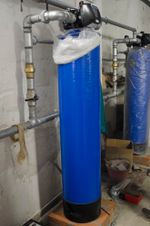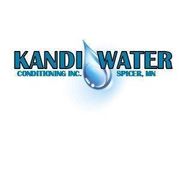How Does a Water Softener Work?

Water is considered hard if it contains a lot of calcium, magnesium, or other minerals. Water accumulates minerals from the rock and sediment it touches before it reaches your home. These minerals are damaging to pipes, appliances, and, to a lesser extent, the people who drink it. A water softener filters hard water to remove the damaging minerals. Here is a guide on water softeners and how they work.
Hard Water
Calcium and magnesium dissolve into scale. Scale appears as a white powdery substance when heated, and sticks to the inside of tea kettles, coffee pots, water heaters, and industrial equipment. It also appears in the bottom of sinks, showers, and toilets as a rust-colored stain. This hard powder will build up inside pipes and eventually limit water flow. Scale is the main reason water heaters go out, and it raises your electric bill by increasing the amount of power needed to push water, especially when hot, through your pipes. Metal pipes are more susceptible to scale damage because rust can start to form if untreated. To help eliminate hard water, a professional can install a water softener to the household plumbing system.
How Water Softeners Work
 Water softeners contain small porous plastic resin lined with sodium molecules. As hard water passes through the filtration system, the calcium and magnesium are pulled from the water and attached to the positively charged sodium resin, which creates soft water. The soft water is then returned to your plumbing system for your use. The resin continues to accumulate the mineral particles, so every couple of days the water softener uses a concentrated solution of sodium chloride to pull the minerals from the resin. The now-rich mineral water is flushed into the drain, and the softener prepares to start the process all over. This process does add 750 milligrams of sodium to each gallon of water, so those with sodium concerns can seek out a potassium chloride alternative, but it is a bit more expensive.
Water softeners contain small porous plastic resin lined with sodium molecules. As hard water passes through the filtration system, the calcium and magnesium are pulled from the water and attached to the positively charged sodium resin, which creates soft water. The soft water is then returned to your plumbing system for your use. The resin continues to accumulate the mineral particles, so every couple of days the water softener uses a concentrated solution of sodium chloride to pull the minerals from the resin. The now-rich mineral water is flushed into the drain, and the softener prepares to start the process all over. This process does add 750 milligrams of sodium to each gallon of water, so those with sodium concerns can seek out a potassium chloride alternative, but it is a bit more expensive.
If you see white, powdery residue in your appliances or water spots that won’t go away after washing dishes, then a water softener is a good option. Call a professional team with over 20 years of experience in improving residential and industrial water supplies. Kandi Water Conditioning, located in Spicer, MN, has helped Kandiyohi County clients improve their water supply and increase the life span of their plumbing systems. Their water conditioning services include the latest innovations in the industry at affordable costs. To start improving your drinking water, call (320) 796-6020. Also, to learn more about their reverse osmosis drinking water systems, visit them online.
About the Business
Have a question? Ask the experts!
Send your question

